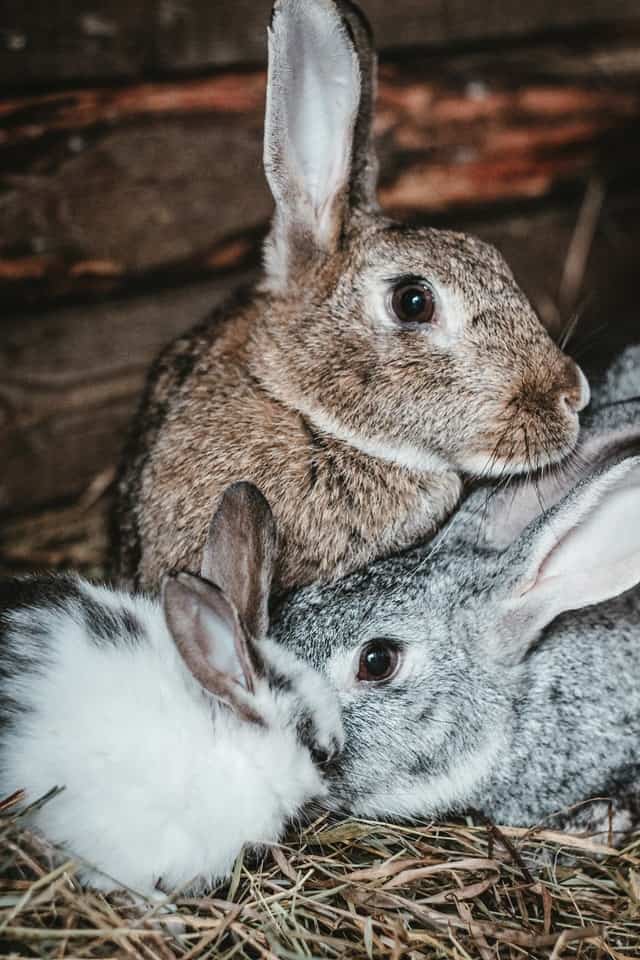
Many of us who decide to share our lives with a rabbit are surprised when they begin to mark their territory. To avoid this situation, we want to talk about sterilization in dwarf rabbits.
Sterilization in male rabbits
When a male rabbit reaches sexual maturity, it begins to manifest dominance and marking. This translates into being aggressive (riding homeowners’ legs, biting, hitting the ground repeatedly with their hind legs and making those characteristic angry “puffs”), urinating around every corner of our house, and being more nervous. than is already common in them.
Although most rabbits are used to using a tray to relieve themselves, with heat this can change as they have the need to mark territory through their urine and feces. Neutering your rabbit provides it with a longer, higher quality life, as well as mitigating its behaviours, such as gnawing and territorial assaults. You should neuter your rabbit from six months, depending on its sexual maturity, by a veterinarian with experience in rabbits (specialist in exotics). For rabbits older than two years, the first thing is that the veterinarian performs a check-up to verify that everything is fine.
Advantage:
- Eliminate or at least reduce their marking of their territory. For sterilization to be truly effective it must be done as soon as this behavior begins to be observed.
- Decreases the smell of urine.
- It’s easier for you to learn to relieve yourself on your corner.
- Reduce destructive behaviors (biting, digging).
- They show less aggressive behavior.
- It reduces the behavior of mounting and its desire to reproduce.
- It facilitates coexistence with other rabbits, since nervous and aggressive behavior caused by hormones generally disappears.
- Although males are usually neutered to improve behavior problems since they do not run the same risks to their health as females, you will not have to worry about abscesses or testicular cancer.
Sterilization in female rabbits
Rabbits suffer (as do female dogs, cats and ferrets) the inevitable infections of the uterus. Their reproductive cycle is more similar to that of female cats, with induced ovulation, and just as cumbersome. In addition, of course, breast tumors, ovarian cysts that cause permanent jealousy and lead to uterine infections.
An advisable age to sterilize a doe is 6-8 months of age. They begin their reproductive function earlier, but their low weight and other peculiarities make it advisable to wait until half a year of life. Whole females are at very high risk of dying from uterine cancer after 3 years. It is a very short life expectancy for an animal that can give us 8 to 12 years.
Advantage:
- It eliminates the risk of pregnancy and unwanted offspring, in addition to the fact that pregnancy, childbirth and the raising of the kits can deteriorate the health of the mother.
- It reduces the aggressive behavior of the female, she will no longer be so protective of her “nest” or of her territory.
- Psychological pregnancies will not occur.
- Eliminates or at least reduces the marking of the territory and urine spray.
- It’s easier for you to learn to relieve yourself on your corner.
- Reduce destructive behaviours (biting, digging).
- It sweetens the character and makes a harmonious coexistence with other rabbits possible.
- In addition to all these benefits, spaying non-breeding females is highly recommended to prevent the risk of various uterine diseases. One of the most common is uterine adenocarcinoma but there are also other uterine diseases such as pyometra, uterine aneurism and endometritis.
At what age are rabbits too old to spay?
The opinion of veterinarians varies a lot, but in general, from the age of 6 anesthesia and surgery carry more risks.
In rabbits over 2 years old, it is recommended to do a complete examination to verify their health and detect any problems that may make the surgery more risky.
Is sterilization safe for rabbits?
The operation is a safe procedure when done by an experienced rabbit veterinarian. A specialist veterinarian can operate on a healthy rabbit with very little risk. The percentage of risk is minimal compared to that of contracting a tumor.
Would it be better not to sterilize them?
Spaying reduces the chance that a rabbit will get cancer or a related disease.
Since most rabbits that are bought as pets are not intended for breeding, one of the main reasons for opting for sterilization is to improve the behavior of the sexually mature rabbit. The operated rabbits tend to be calmer, affectionate and better companions.
The litter of a doe can be between 6 and 12 young. For two months you should provide all the necessary care and then find a responsible home for each of the offspring. Isn’t it better to adopt a rabbit that really needs it? If this is not possible, please do not contribute to the excess population of rabbits, you will also allow those who have already been born to find a home.
Have you decided to sterilize your rabbit?
First of all, look for a good exotic animal veterinarian.
The operation is relatively quick and recovery varies from rabbit to rabbit.
We must not forget that males will remain fertile for a few days, and hormones will be high for a few weeks. So they will continue to show that territorial behavior and sometimes something aggressive for a few more days. If he lives with females, we must separate them until he has relaxed and can no longer fertilize any female.
What care does my rabbit need after surgery?
After sterilizing your rabbit, you should place it in a quiet place where it can rest. It is normal for him to be sleepy and with a poor appetite, but you will see that he soon recovers. Give him foods that he likes so that he starts eating as soon as possible. Let it move as it wants, avoiding jumps and sudden movements and check the wound every day, applying the dressings that the vet has indicated. The scrotum in males is usually very inflamed due to fluid accumulation, but as long as there are no signs of discomfort or infection, this should not worry you.
It is always difficult to make decisions that are irreversible and that involve even a minimal risk for our pets, but keep in mind that many rabbits have gone through this procedure without negative consequences and with all the advantages that we list. This will lead you to have a more affectionate, docile and healthy pet for many years.






